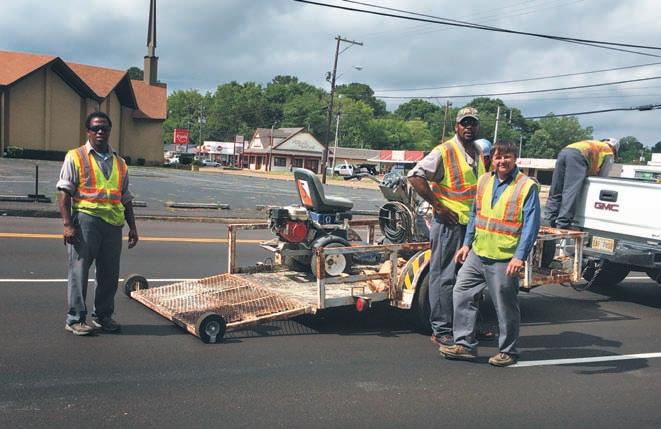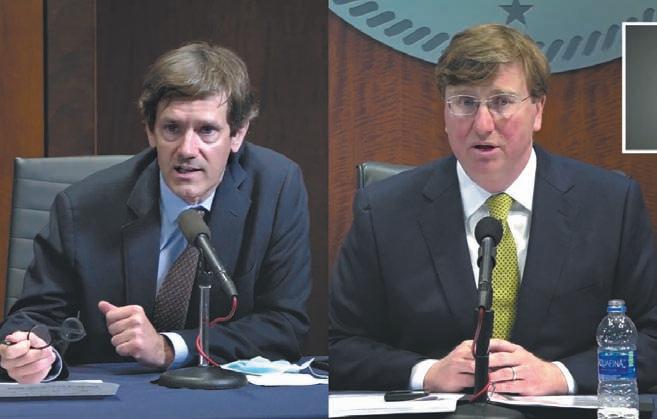TALK JXN
city
Of Water, Heat and Asphalt: An Essential Journey to Paving Robinson Road by Kayode Crown There will probably be a crack by the middle or end of summer.” He observed that the repaving is probably with one or two inches of asphalt on the road, which he posited as not being enough. “It was a real thin layer, I noticed. Moreover, that was before bringing the steamroller. That is why I said that it is not going to last long, in my opinion.”
break up pavements, leading to potholes. Arnemann said rainfall can make the road deteriorate because of the Yazoo clay, based on its peculiar characteristics. He, however, fell short of embracing Brown’s notion that the repaved Robinson Road would go that way in the next few months. He noted that the contractor, Superior Asphalt is competent and qualified contractor Kayode Crown
A road construction crew works on historic Robinson Road in late May.
That Darned Yazoo Clay Michael Arnemann, executive director of the Mississippi Asphalt Pavement Association, lends credence to Brown’s assertion, saying in an interview that potholes may be prevalent in Jackson because of the Yazoo clay under the road surfaces. In 1988, the Mississippi Department of Natural Resources’ Bureau of Geology documented the qualities of the clay that make it a lousy substructure for construction. The report noted that the expansive nature of the soil is a primary cause of foundation and structural damage experienced in the Yazoo clay belt, especially in Jackson. It can absorb large quantities of water during prolonged periods of rainfall or flooding. It expands when saturated and strains the structure placed on it, like road pavements. Yazoo clay is noted for being largely without impurities like sand, silt and organic material that can minimize that expansion. It swells and then shrinks considerably upon drying. This causes weakened areas that crack during dry periods and have the potential to compromise the superstructure. In the case of roads, it can
who follows specifications of the local public agency in charge of the job. “They are doing it to the best of their ability,” he said. “They go in and ground out 1.5 inches of existing pavement, and they put another 1.5 inches in its place,” Arnemann said of the contractor. There needs to be more probably; there probably needs to be two, maybe even three inches, but there is not enough money for that to happen. I cannot speak to how long it would last, but it should last for a long period of time.” A Dearth of Funding Arnemann, who worked in the Mississippi Department of Transportation for more than eight years before joining MSPA in 2018, fingered the dearth of funding for road construction over decades as the major problem for local streets. “The roads in Jackson for the last multiple decades are underfunded,” he said. “The overall solution is more money towards infrastructure, more dedicated money to the city. We have a funding problem. “We are operating on a fixed funding mechanism, the gas tax, which has been in
place since 1987.” The 18.4 cents per gallon gas tax funds MDOT. Unchanged since 1987, it is one of the lowest in the U.S. “We are executing a 1987 business model in 2020, and that does not work for an industry like infrastructure. It not only doesn’t work for most industries but infrastructure, civil infrastructure have very heavy costs associated with it,” Arnemann said. “Asphalt is expensive, steel is expensive, concrete is expensive, these are major items that are not cheap, and they are not cheap because, given proper application, they last—they perform their function for a long time.” “To do it right, you have to have the amount of money required to get the job done. And there is not enough money to keep up with the number of needs in Jackson and the state. It is a funding problem, nothing else,” he argued. “The people have to speak up as they did for the 1-percent sales tax. The people of Jackson overwhelmingly voted for that mechanism, when they knew it was for roads and infrastructure.” Nine in 10 people of Jackson voted for the 1% sales tax increase in 2014. Arnemann posited that if the people of Jackson knew there would be an additional level of tax on gasoline and motor fuel and the money dedicated to roads and bridges maintenance and construction, they would similarly support it. “But the people have to speak up and talk to their representatives and talk to their legislators, call their elected officials, city council members, mayors and say ‘we want our roads fixed.’ Like the Burbs in the 1950s Jordan Brown, who said his family has sold cars on Robinson Road for 32 years, described it as an ancient area, which in the 1950s used to be like the suburbs. “(The) west Jackson part of the town would be considered a suburb, very exclusive, where it was kind of dangerous to be black on this road. That was the downside,” he said. “This building we are in right now used to house Goodyear (Tires); it was one of the oldest buildings on this block, the 2600 block. And two doors from here was a bank. That was in the ‘50s.” Along the road, the Jackson Free Press spoke with a motorist who gave his name as James Douglas. He acknowledged how good the repaving of the Robinson Road more PAVING, p 10
May 27 - June 9, 2020 • jfp.ms
J
ordan Brown, a car seller, has a deep connection to Robinson Road. He started working with his father in his auto-services business on the thoroughfare that runs through west and south Jackson in 1999 when he bought the current building where his company operates. “Robinson Road is the oldest road in Jackson, Mississippi, and has much historical value,” Brown told the Jackson Free Press. It reportedly linked the new capital city with Columbus in the early 19th century. “Moreover, if you do a traffic report, it is probably one of the busiest in the city.” The 33-year-old was delighted that the road is getting the attention it needs after many years of neglect. The City of Jackson, in conjunction with Hinds County, recently started a three-phase repaving of the road. Phase one will repave Capitol Street to Ellis Avenue, and Ellis Avenue to Highway 80 is phase two. The third phase is Highway 80 to Interstate 20. Brown said before the repaving, while Ellis Avenue to Highway 80 was “pretty decent,” Ellis Avenue to Capitol and Gallatin Streets was “terrible.” He added that “many people burst their tires on this road or hit the sidewalk or something like that.” People come into his store, lamenting they had just burst their tires after driving into a big hole on the road, he said. Brown is confident the paving will make residents happy. “It makes the city more attractive for people to come visiting,” he said. Brown, who helps people start businesses does not believe, though, that excitement over the newly repaved road will last, saying that the volume of rainfall in Jackson every year can quickly erode the asphalt. Jackson experiences 54 inches of rainfall a year on average, which is 16 inches higher than the national average. “We have to see how long the road is going to last. It rains here a lot, and when it rains, it erodes the gravel as well as the soil,” he said. “It erodes it, and it breaks apart easily. It rains a lot in the state of Mississippi. It rains here, and everything erodes here. The road may not last long. It does not matter if there are five inches of tar on the road; it will just go like that. “My prediction is that it will not last more than the summer or fall. ... Every time it rains, it just makes the asphalt soft, and here when it rains, it makes the humidity high, and the asphalt gets soft, and it cracks.
9







